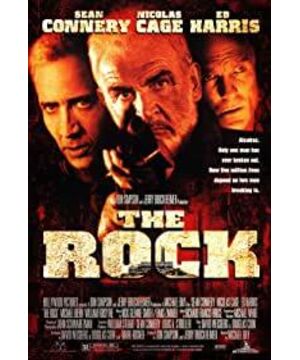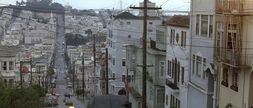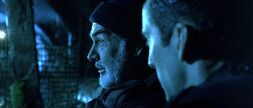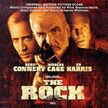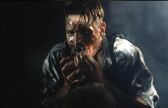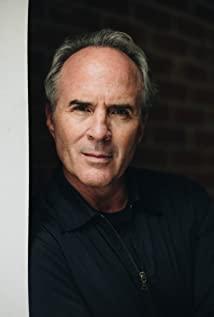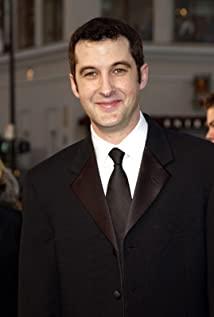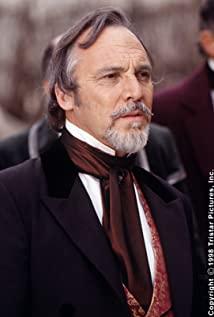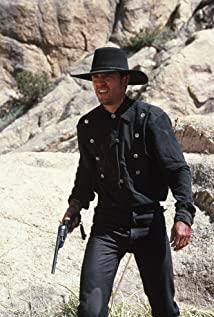Watching "Stone Shattering" in 2021 will still leave an indelible impression on me. As the intensive narrative progresses, ten to fifteen minutes of gunfights are interspersed, accompanied by Hans Zimmer's god-level soundtrack, and enjoy the excitement of the explosive shell's skilled and appropriate rhythm. The charming old man Sean, the face in my mind has not yet disappeared from the director's corner of "The Truman World". At that time, the actor Cage, who was popular all over the world, worked together to create a great commercial film that is still difficult to disappear from film and television ( grossed $335 million worldwide).
The shooting of "Stone Shattering" cost a lot of money, and many scenes were shot in real life. Many actions, including entering tunnels and holding guns, reflect well-trained training. It is even rumored that the film directly used Navy SEALs to assist in shooting; not to mention the focus of "Stone Shaking". The controversial issue that the US government does not recognize soldiers who died overseas made the film a sensation before it was released. In addition, according to director Michael Bay, "the script of the film is more serious than the finished film, and many humorous elements are temporarily added during the shooting process", which all add more to the film The life-like elements invigorate the atmosphere and tighten the rhythm. It is worth mentioning that there is a sentence "This film is dedicated in loving memory to Don Simpson" at the end of the film. Simpson is a very representative filmmaker in the 1990s in the United States, who conveys what he thinks through the screen. American spirit, "Stone Shattering" is produced by him. In 1996, Simpson died of an overdose of drug inhalation, and "The Rock" also became his last work.
However, for a popcorn movie, the biggest impression on me of "The Rock" is the setting of its villain. If the above-mentioned advantages can be solved with investment, technology and configuration, then the setting of this villain not only reflects the skill of the screenwriter, but also examines the actor's grasp of the meaning of their respective roles.
The beginning of the film begins with a terrible memory. Later, Colonel Hammer kissed his beloved wife Barbara's tomb in the rainy day and said the words that laid the foundation for this shocking action. From here, Hammer's contradictions are slowly dissected out. It can be said that from the beginning, what Hammer said later about what the U.S. government did to overseas soldiers was true. So with this, Colonel Hammer naturally started his own operations, first attacking the naval base to obtain gas bombs, and then hijacking 81 hostages, threatening the US government to give 100 million US dollars. But here, there are several details worth noting: 1. When the U.S. military later mentioned the incident of Hammer stealing the gas bomb, it was described as "savage but not lethal", which shows that he still respects Hammer. Soldier's life. 2. Before taking the hostages, Hammer said this to the children on the island: "I need you to tell you teacher that you need to get back on the boat and go home." Mo's original intention, but the tourists did not leave, so they took advantage of the situation as a bargaining chip with the government. 3. Colonel Hammer once said a very interesting sentence: "In time, so shall we (history will make us innocent)", which is a bit of a villain and once again confirmed the contradictory nature of this action.
The Colonel's line was followed by the Agent Mason line, which ran parallel to the Colonel's line for some time thereafter. Mason's appearance was not only without warning, but also mysterious. Especially the opening scenes of "Shakespeare" and "Sun Tzu's Art of War" proved Mason's extraordinary. First a series of negotiations, then hotel riots, Hummer grabs, bumper cars on the road—familiar blockbuster elements. But in this chain of events, "top secret" was mentioned the most. Then the meeting of Mason's father and daughter wrapped a piece of cloth around Mason's identity. justice? Injustice? There's no way to gauge Mason's role at the moment. In any case, the man who had just created a huge obstacle to the resolution of the crisis now had to fight alongside Goosby and the government, whether he wanted to or not. For audiences, Mason became the biggest villain for a short time, but with his compromises and the ambiguity of his origins, the idea quickly faded.
After a series of tight plots, Alcatraz still cannot be captured. What ushered in a turning point was the conflict within the Alcatraz soldiers. All at once, General Hammer's feat of changing the coordinates of a fired missile showed that he wasn't out of luck. Hammer just wanted to get pensions for the families of the dead soldiers, and the plan was just to get there faster. He couldn't bear to see 80,000 innocent citizens die because of it. The film also specially gave close-ups at this time, some walking on the beach, some lying on the lawn enjoying the sun, the stadium was full of people cheering... Even if Hammer got 100 million dollars after the bomb exploded, it was covered with 800 million dollars. The blood of thousands. Hammer's ability is to fight for the rights and interests of "people". As a soldier, why would he bear to sacrifice the rights and interests of "other people"? The situation in the film changes dramatically, as the mercenaries demand to fire missiles in exchange for money to pay their commissions. In fact, this result is what the director and the audience want to see the most. Originally, Hammer was a contradictory villain. At this moment, he cleverly removed him from the villain's lineup, so that the group of mercenaries will undoubtedly become the deserving villain. Destroyed object? So far, the villain of the film has turned into a mercenary.
The U.S. government, with heavy losses of soldiers and unaware of the struggle between mercenaries, offered to bomb Alcatraz. Some people may ask, the loss of bombing Alcatraz must be much larger than the loss of 100 million US dollars, why should it still be executed? For the US government, they will certainly not admit that what Hammer said will not meet Hammer's demands, because it means admitting their own faults. In the film, the president says this when he announces his approval for the bombing:
the past few hours
The darkest, longest time of my life
How should human life be measured? One million citizens and 81 hostages
And Frank Hammer
We ignore and abandon great heroes like Hammer
And ignore the children of soldiers who gave their lives for the country
The same truth, the same sadness
We declare war like terror
War will have casualties
This is the hardest decision I've ever made
approve air strikes
So the real face of the government was revealed: the anti-terrorist attack was the excuse for their bombing of Alcatraz, and even the president himself admitted the government's fault, but this history must be hidden from the public. Rather than saying that the US government does not pay a penny is a firm stance against terrorism, it is better to say that the past will always be the past. Imagine if the missiles did go off in the end, or if Mason and Goosby didn't magically rescue the citizens and hostages, the real culprit would undoubtedly be the government (a bomb was fired before the air strike, so maybe both heavy losses), innocent people became scapegoats for a covert and irresponsible government.
At the end of the film, Goosby, who was newly married, took the miniature scroll he got from the leg of a church chair in his white car and said, "Hey! Do you know how Kennedy died?" The secret that they are looking for is afraid of leaking!
In this film, choice has become a golden key to test the characters. However, only in desperate situations can we show the true face of a person.
Mason: Mason's choice I want to talk about is that he ended up giving Gusby the address of the microfilm that had cost him his life. I think this is first of all a kind of repayment, secondly a kind of relief, and finally a kind of ridicule - ridiculing myself for struggling all my life but having no identity in the UK or the US. Mason once said a poignant thing to her daughter: "You are the only one who can prove my existence". And this microfilm may be "the only thing that proves his existence." He disappeared from the world and "evaporated at sea", but behind this is a personal tragic reminder under the political game. But this is also good, Mason finally stopped worrying and suffering for this, and was able to see his daughter again and catch the last bus of his life.
Goosby: Goosby chose to lie at the end of "Mason is dead". From here, I think Goosby may have really understood some of Mason's suffering. He got the microfilm (extremely light) after his wedding (extremely happy), and saw the inside story of the political game between countries (extremely heavy) in the car (extremely simple and ordinary), which melted the heavy Why is the simple romance of political contradictions not touching?
Colonel: "Then you don't know the pain of seeing good soldiers betrayed by their government," the colonel told Mason. In a way, the colonel is noble. Although he himself is famous, he still fights for the interests of some soldiers. The reason I don't think the Colonel is a terrorist attack is because he changed the coordinates to harm civilians. The contradiction between the colonel's change of coordinates is the injustice of the dead soldiers, and the lives of innocent civilians are at stake. He chose not to harm civilians. His choice is also destined not to be reviled. As for the mercenaries, they were the exact opposite of the colonel's choice. They chose money and were doomed to perish.
Government: The government's choice is contradictory, but apparently they don't really take into account who those innocent people are dying for. Politicians, in order to reduce the cost and cover up right and wrong, choose not to face one size fits all. In the end, it seems that they have always contributed to become the biggest villain.
Whether mercenaries choose money or politicians make controversial choices, they all have their reasons. But it is the choice of these small benefits that abandons the righteousness that makes them ultimately only "villains". Movies are movies after all, and the definition of villains in life is more ambiguous. But under any difficult choice, those who stay true to their hearts get their fair share, even if they don't end well -- like Hammer and Mason.
View more about The Rock reviews


